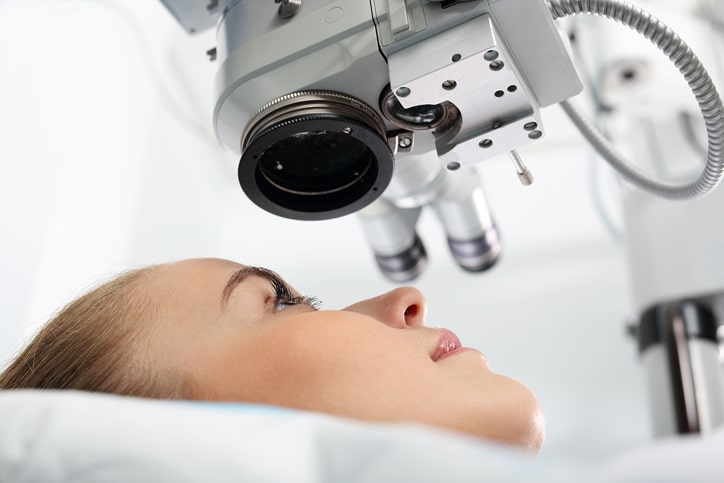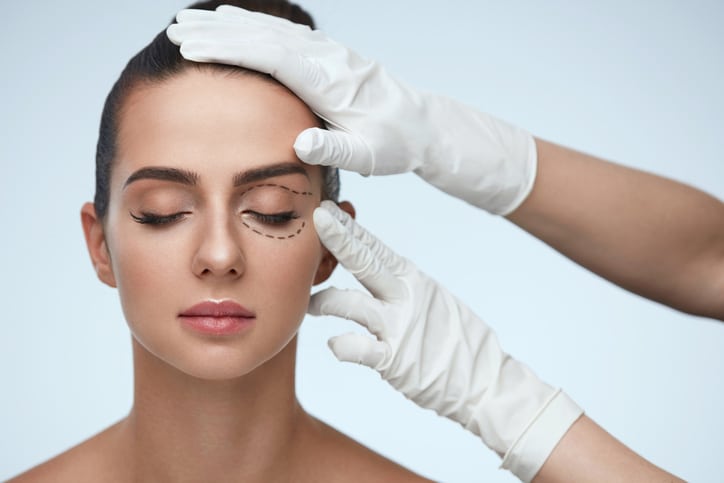Plastic surgery is a term with which most people are familiar. This term may bring to mind cosmetic procedures such as a facelift or tummy tuck. Oculoplastic surgery is similar enough to the broader term that it may create misconceptions or confusion. As a board-certified, fellowship-trained oculoplastic surgeon, Dr. Murrell has helped many people regain confidence and comfort through precise procedures and treatments. Here, we discuss the particulars of this medical specialty and what it may mean for you.
What Is Oculoplastic Surgery?
Oculoplastic surgery is the term used to categorize procedures that correct some aspect of the eye, including the eye socket, eyelids, tear ducts, and more.
Procedures performed by an oculoplastic surgeon may be either reconstructive or cosmetic in nature.

Each treatment that is conducted is done in a way that improves appearance, vision, comfort, and the overall health of the eye.
Benefits Of Going To An Oculoplastic Surgeon
An oculoplastic surgeon is first a board-certified ophthalmologist. An ophthalmologist is a medical doctor who has received extended training beyond medical school to diagnose and treat eye diseases and conditions such as cataracts and more. In addition to ophthalmology training, an oculoplastic surgeon has also undergone specific experiences in which the eyes and structures around the eyes are diagnosed and treated. Dr. Murrell completed an oculoplastic fellowship under an esteemed medical specialist who has contributed to medical textbooks in the area of oculoplastics.
A general plastic surgeon is a specialist who has been trained in the broad range of all plastic surgery procedures. In contrast, an oculoplastic surgeon has been trained specifically in the eye and peri-orbital area. The narrower focus of the oculoplastic surgeon compared to a general surgeon or general plastic surgeon provides patients with the highest degree of familiarity with ocular anatomy possible.
How Will I Know If I Need Oculoplastic Surgery?
Many of these surgeries are necessary for the health of your eyes. For instance, no one should leave a tumor on an eyelid to avoid surgery. When an eyelid is turned inside out or outside in, these conditions won’t heal on their own. They are usually due to problems with the levator muscles and surgery is necessary to correct the eyelid function. There’s no reason to live with the scratchy, dry eyes that are a result of these eyelid problems.
The one area where there could be vacillation would be aesthetic eyelid surgery, blepharoplasty. When will you know it’s time for this surgery? When you look in the mirror and your eyelids are aging your face beyond your years. Maybe friends and coworkers have asked if you’re tired when you’re not; they’re looking at your sagging eyelids. These are completely personal decisions, but cosmetic eyelid surgery is not a difficult procedure. This is a highly satisfying procedure that takes a decade or so off your facial age. Reality? Just about anyone of the age of 40 could benefit from blepharoplasty.
Would I Be A Good Candidate For Oculoplastic Surgery?
Patients come to Dr. Murrell for a variety of oculoplastic procedures. They trust his training, expertise, and experience as a board-certified ophthalmologist. That focus on the eyes gives our patients an added degree of confidence heading into these surgeries.
Candidacy for these surgeries may be purely for aesthetic reasons or they may be necessary to correct problems such as ectropion/entropion or eyelid tumors.
If you feel as if your sagging, droopy eyelids are aging your face beyond your years, blepharoplasty is a great procedure. It’s acknowledged to take about a decade off your facial age. The same is true with ptosis, but the more extensive drooping that merits this surgery can usually lead to insurance coverage.
As for issues such as an eyelid turned the wrong way and causing dry eye, these are conditions that need correcting, so you don’t damage structures such as your cornea.
Candidates need to be healthy enough for surgery, and expectations need to be realistic, but there’s no reason to avoid these surgeries if they are needed or wanted.
Does My Health Insurance Cover Oculoplastic Surgery?
That’s a big “It depends.” Insurance companies are reluctant to cover blepharoplasty, as it is typically deemed elective for aesthetic reasons. The exception here is if the drooping of your eyelids is to the degree they are infringing on your field of vision (more likely a case of ptosis).
Most other eyelid and tear duct surgeries with Dr. Murrell are for the health of your eyes. These are deemed medically necessary and are usually covered. We work with insurance companies to gain the highest level of coverage we can.
What Surgeries Do Oculoplastic Surgeons Perform?
There are several surgical procedures that an oculoplastic surgeon has the unique training to perform. These include:
Eyelid Surgery

Blepharoplasty is a commonly performed eyelid surgery that rejuvenates the appearance of the eyes.
Usually performed on an outpatient basis, this procedure may be conducted on the upper or lower eyelids or both.
During the procedure, fat tissue and skin are manipulated as needed, tightened, and secured to smooth the appearance of the eyelids.
Most blepharoplasties are performed for cosmetic reasons. However, there are sometimes functional reasons to undergo this procedure. If the skin on the upper eyelid is falling into the field of vision or pushing the eyelid closed to the point of affecting vision, blepharoplasty may be medically necessary.
Eyelid surgeries may also be performed to address structural problems. Ptosis repair is a common procedure in which the muscle that opens the upper eyelid is corrected. Ptosis is a condition in which the muscle does not allow the eye to open as fully as it should. This problem cannot be adequately corrected with blepharoplasty, which is one reason why ptosis should be diagnosed and treated by an oculoplastic surgeon. Additional eyelid procedures include ectropion and entropion repair, eyelid tumors, and reconstruction after eyelid trauma.
Tear Duct Surgery
Tear duct surgery is referred to as dacryocystorhinostomy. This procedure is performed when one or both eyes are not draining tears normally. This can lead to excessive, disruptive tearing. Dacryocystorhinostomy surgery creates a new tear drain opening directly from the blocked duct so tear film can properly drain into the nasal passageway.
Other Oculoplastic Surgeries
During testing Dr. Murrell is looking for signs of eyelid problems such as the following:
- Ptosis of the upper eyelid (droopy lids)
- Ectropion of the lower lid (lid pulling down and/or out)
- Entropion of the lower lid (lid turning inward)
- Eyelid Lesion of the upper and/or lower eyelids
- Eyelid Tumors on the upper and/or lower eyelids
- Reconstructive Surgery on upper and/or lower lids
- Orbital Surgery (including tumor biopsy and tumor removal)
- Blepharospasm and Hemifacial Spasm
"Everyone is very well organized, smile, speak to me very nicely, look at me when they speak, I like that. Doc is very professional, good man. Wonderful staff, they make you feel welcome."
"My experience with Dr. Murrell has been very pleasant and very effective. I am thankful my primary doctor recommended him. I will recommend him to all"
What Type Of Anesthesia Is Used For Oculoplastic Surgery?
Some patients are amazed, but most of these procedures with Dr. Murrell are performed under local anesthesia, usually with some level of sedation. They are not general anesthesia procedures any longer. This creates easier recovery and fewer complications for our patients. Obviously, general anesthesia would still be necessary in more involved procedures such as orbital surgery and some reconstructive procedures, but most other oculoplastic surgeries are done with local anesthesia.
Results Of Oculoplastic Surgery

Most patients who undergo oculoplastic surgery are happy or very happy with their results. Once the eyelids have been properly corrected, results last indefinitely. Ongoing aging does affect the eyes, but blepharoplasty typically only needs to be performed once to keep the eyes looking younger.
Recovering After Oculoplastic Surgery
Eyelid surgery can cause temporary swelling and dry-eye symptoms. Patients are encouraged to rest as much as necessary during the first several days after surgery. While it is possible to return to work and normal, light activity a week to 10 days after eyelid surgery, it can take a few months for mild, residual swelling to subside.
Aftercare For Oculoplastic Surgery
The various oculoplastic surgeries Dr. Murrell performs generally don’t involve difficult recoveries, with the exception of reconstruction surgery or orbital tumor removal surgery.
Otherwise, oculoplastic surgery such as blepharoplasty doesn’t create lots of acute pain and recovery is faster than you would assume. The key when you’re at home following these procedures is to take it easy at first. Lay low in your recovery nest (complete with lots of pillows and blankets) for the first few days. During these days, being diligent about applying the cold compress we supply is key. If you are good about this, you can really minimize the amount of swelling and bruising that occurs.
Also, you’ll be tempted to watch lots of TV or read in the first couple of days, but this isn’t a great idea early on. It’s better to sleep as much as possible to let your eyelid tissue relax with your eyes closed.
It’s key to keep your blood pressure down across your face. That means no exercise for a couple weeks and start that with less strenuous options. No bending over. No lifting anything that creates strain.
Finally, don’t push things during your recovery. It’s always tempting to bump up the timelines a bit, especially if you’re feeling good. But following Dr. Murrell’s instructions to a T is key to the easiest recovery with the best results.
Is Oculoplastic Surgery Painful?
You would think surgery on such a delicate area as the eyelids and other areas of the eye would be ultimately painful. These are sensitive areas. But they are also highly vascularized, and this works in your favor.
Dr. Murrell provides prescription pain medication for your recovery, but many patients never feel the need for it, feeling that over-the-counter options handle the discomfort.
Part of the reason there isn’t a ton of acute pain with these surgeries with Dr. Murrell is because he works hard to keep your incisions to a minimum. Small incisions equal less pain during recovery.
Potential Risks Of Oculoplastic Surgery
There are risks with any cosmetic or functional facial procedure. Primarily, there is the risk that a patient may not be happy with the results. Dr. Murrell spends time discussing with each patient what is and is not possible with their desired or necessary procedure. In this way, realistic expectations for the cosmetic outcome are clearly set.
Surgical procedures also carry a risk of medical complications. An experienced oculoplastic surgeon has developed techniques that significantly reduce the risk of scarring, ptosis, asymmetry, overcorrection, and other problems. Good post-operative care can greatly reduce the risk of infection.
What Is the Most Common Oculoplastic Surgery?
The most common oculoplastic surgery patients request is blepharoplasty, otherwise known as the eyelid lift. This procedure involves the removal of excess fat or stretched-out skin from the eye area, allowing patients to look younger and sometimes even improve their vision.
A blepharoplasty can provide the following benefits:
- Reduce eye puffiness
- Improve vision
- Restore youthfulness
- Eliminate the “tired” look from the eye area
- Smooth forehead lines
- Minimize dark circles
- Provide minimal scarring
- Make the eyes appear brighter and more awake
- Increase self-confidence
How Do You Prepare for Oculoplastic Surgery?
Preparing ahead of time for your oculoplastic surgical procedure can help you achieve a complication-free treatment as well as an easier recovery. Before the day of your surgery, we recommend patients prepare properly by doing the following:
- Consult with your primary doctor to determine if current medications may interfere with your surgery.
- Avoid aspirin or anti-inflammatory drugs and supplements that can lead to blood thinning.
- Quit smoking.
- Arrange transportation with a loved one to and from your procedure.
- Prepare your home for recovery.
- Wear comfortable clothing for your procedure.
- Ask any remaining questions you may have about your procedure.
What Is the Difference Between a Plastic Surgeon and an Oculoplastic Surgeon?
As a board-certified, fellowship-trained oculoplastic surgeon, Dr. Murrell provides high-quality treatment for patients looking to improve the appearance of their eye area as well as improve vision and the overall health of their eye. Unlike plastic surgeons, whose training can focus on larger areas in different parts of the body, an oculoplastic surgeon has specified training treating the small upper area of the face around the eyes. Because the eye area is a delicate space, an oculoplastic surgeon is an expert at being precise, working in a tight area, and using small, controlled movements and techniques to provide optimal results.
Read What Our Patients Are Saying!
"Everyone is wonderful, very helpful! Dr. Murrell is great."
Click here to read more reviews.
Schedule Eye Plastic Surgery In Amarillo, TX Or Call With Questions
To schedule an Oculoplastic surgery appointment with Dr. Murrell, call our office at: (806) 351-1177. You may also click here to submit a contact form.
